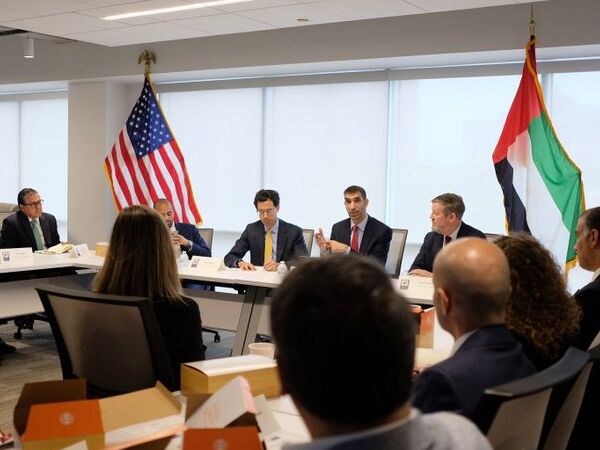The UAE and US are examining potential investment prospects as part of their push towards clean technology.
A delegation of senior officials from the United Arab Emirates (UAE) visited the US state of Texas recently to identify new investment opportunities and collaborations for private-sector companies. The trip, which was led by Dr. Thani bin Ahmed Al Zeyoudi, Minister of State for Foreign Trade, focused on strengthening bilateral trade ties, particularly in the IT, automotive parts, and machinery verticals.
During his visit, Al Zeyoudi held a meeting with Austin Mayor Kirk Watson to promote the UAE’s streamlined business registration process, skilled workforce, and world-class infrastructure, and to encourage further investment and trade from the state. He also attended an Austin Chamber of Commerce Roundtable, where he discussed new avenues to boost bilateral trade and held a number of one-on-one meetings with leading Austin-based start-ups.
These start-ups are deploying advanced technologies such as artificial intelligence, blockchain, and quantum computing to improve various sectors including real estate, emergency response, logistics, utilities, and media. During these meetings, Al Zeyoudi highlighted the UAE’s unique innovation ecosystem and emphasized the market-access incentives provided by the NextGenFDI initiative. This includes rapid incorporation and licensing, bulk visa issuance, and ready access to banking facilities and real estate.
The visit to Texas concluded with a site visit to Stealth Power, a provider of fleet electrification and off-grid solutions that lower carbon emissions across utility, emergency, and military fleet vehicles. This visit aligns with the UAE’s commitment to finding new avenues of cooperation to uphold its Net Zero pledge.
“The United States is a long-standing trade and investment partner for the UAE – and an important ally in the battle to develop alternative sources of energy,” said Al Zeyoudi. “In November 2022, we signed the Partnership for Accelerating Clean Energy, which is mobilizing $100 billion to develop 100 gigawatts of clean energy by 2035, and we remain committed to finding new avenues of cooperation to uphold our Net Zero pledge.”
Al Zeyoudi’s visit to Texas is part of a wider strategy to build and strengthen international partnerships to achieve the UAE’s sustainability goals. The UAE aims to become a global leader in sustainability, including clean energy, and has set ambitious targets to reduce carbon emissions, increase the use of renewable energy, and promote sustainable economic growth.
The UAE and the United States have a longstanding trade relationship, with bilateral trade valued at $25 billion in 2020. The Partnership for Accelerating Clean Energy, which was signed in November 2022, is a further indication of the two countries’ commitment to working together to achieve their sustainability goals.
Overall, Al Zeyoudi’s visit to Texas is a positive development in the UAE’s efforts to build stronger partnerships with the United States and promote sustainable economic growth. With the UAE’s world-class infrastructure and skilled workforce, and Texas’ innovative start-up ecosystem and commitment to sustainability, there are numerous opportunities for collaboration and investment between the two regions.
The visit by the UAE delegation to Texas highlights the growing importance of international partnerships in achieving sustainability goals. As countries around the world seek to transition to a low-carbon future, collaboration between governments and private sector entities is becoming increasingly crucial.
The UAE has been at the forefront of the clean energy transition, with ambitious targets to reduce carbon emissions and increase the use of renewable energy sources. The country has also established itself as a hub for innovation, particularly in the areas of artificial intelligence, blockchain, and quantum computing.
The visit by the UAE delegation to Texas is just one example of the many initiatives underway to promote sustainable economic growth and reduce carbon emissions. As countries around the world continue to prioritize sustainability, it is increasingly clear that partnerships between governments and private sector entities will be essential to achieving these goals.





